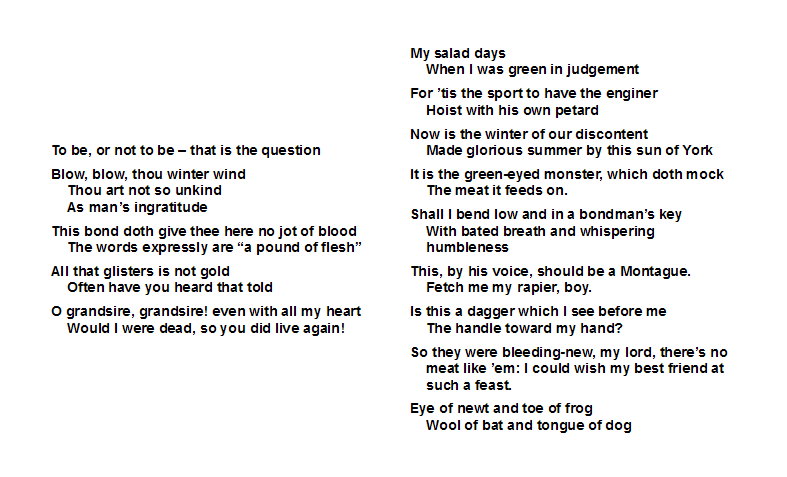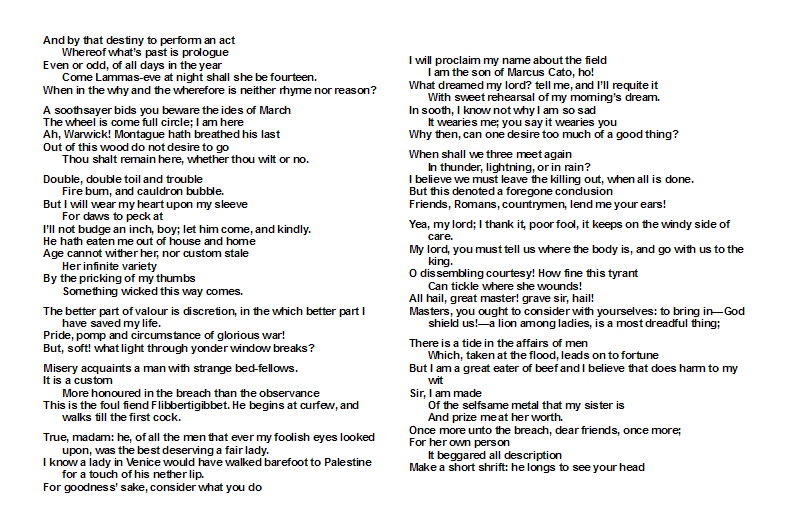
When I had the idea to use quotations from Shakespeare for this year’s card, I thought of using initial letters of the plays from which they came as the code. The thirty-eight plays are conveniently more numerous than the letters of the alphabet, but it was to be expected, of course, that required letters would be missing as initial letters of the titles. So I have instead used the initial letters of the characters whose lines these are as the code. “To be, or not to be – that is the question”, for example, is spoken by Hamlet (in the play Hamlet, but that is irrelevant here) and thus represents his initial letter H.
There is some ambiguity over characters’ names, and I have used some licence: thus I have used the Duke/Earl of Somerset for S and Nick Bottom as N, even though he is usually known only as Bottom. I have also been pragmatic but inconsistent over spelling: some words have been modernised, but not others.
The message I needed omitted some letters of the alphabet, for example J – which meant I couldn’t include Juliet – and G – so I could include Rosencrantz but not his friend Guildenstern.
Front page

This translates as:
|
H |
Hamlet |
To be, or not to be – that is the question |
|
A |
Amiens |
Blow, blow, thou winter wind |
|
P |
Portia |
This bond doth give thee here no jot of
blood |
|
P |
Prince of Morocco |
All that glisters is not gold |
|
Y |
Young Lucius |
O grandsire, grandsire! even with all my
heart |
|
|
|
|
|
C |
Cleopatra |
My salad days |
|
H |
Hamlet |
For ’tis the sport to have the
enginer |
|
R |
Richard [Duke of Gloucester] |
Now is the winter of our discontent |
|
I |
Iago |
It is the green-eyed monster, which doth
mock |
|
S |
Shylock |
Shall I bend low and in a bondman’s
key |
|
T |
Tybalt |
This, by his voice, should be a Montague. |
|
M |
Macbeth |
Is this a dagger which I see before me |
|
A |
Alcibiades |
So they were bleeding-new, my lord, there’s
no meat like ’em: |
|
S |
Second Witch |
Eye of newt and toe of frog |
– giving:
Inside page

This translates as:
|
A |
Antonio |
And by that destiny to perform an act |
|
N |
Nurse |
Even or odd, of all days in the year |
|
D |
Dromio of Syracuse |
When in the why and the wherefore is neither rhyme nor reason? |
|
|
|
|
|
B |
Brutus |
A soothsayer bids you beware the ides of March |
|
E |
Edmund |
The wheel is come full circle; I am here |
|
S |
[Duke/Earl of] Somerset |
Ah, Warwick! Montague hath breathed his last |
|
T |
Titania |
Out of this wood do not desire to go |
|
|
|
|
|
W |
Witches |
Double, double toil and trouble |
|
I |
Iago |
But I will wear my heart upon my sleeve |
|
S |
[Christopher] Sly |
I’ll not budge an inch, boy; let him come, and kindly. |
|
H |
Hostess Quickly |
He hath eaten me out of house and home |
|
E |
[Domitius] Enobarbus |
Age cannot wither her, nor custom stale |
|
S |
Second Witch |
By the pricking of my thumbs |
|
|
|
|
|
F |
Falstaff |
The better part of valour is discretion, in the which better part I have saved my life. |
|
O |
Othello |
Pride, pomp and circumstance of glorious war! |
|
R |
Romeo |
But, soft! what light through yonder window breaks? |
|
|
|
|
|
T |
Trinculo |
Misery acquaints a man with strange bed-fellows. |
|
H |
Hamlet |
It is a custom |
|
E |
Edgar |
This is the foul fiend Flibbertigibbet. He begins at curfew, and walks till the first cock. |
|
|
|
|
|
N |
Nerissa |
True, madam: he, of all the men that ever my foolish eyes looked upon, was the best deserving a fair lady. |
|
E |
Emilia |
I know a lady in Venice would have walked barefoot to Palestine for a touch of his nether lip. |
|
W |
[Cardinal] Wolsey |
For goodness’ sake, consider what you do |
|
|
|
|
|
Y |
Young Cato |
I will proclaim my name about the field |
|
E |
Eleanor |
What dreamed my lord? tell me, and I’ll
requite it |
|
A |
Antonio |
In sooth, I know not why I am so sad |
|
R |
Rosalind |
Why then, can one desire too much of a good thing? |
|
|
|
|
|
F |
First Witch |
When shall we three meet again |
|
R |
Robin Starveling |
I believe we must leave the killing out, when all is done. |
|
O |
Othello |
But this denoted a foregone conclusion |
|
M |
Marcus Antonius |
Friends, Romans, countrymen, lend me your ears! |
|
|
|
|
|
B |
Beatrice |
Yea, my lord; I thank it, poor fool, it keeps on the windy side of care. |
|
R |
Rosencrantz |
My lord, you must tell us where the body is, and go with us to the king. |
|
I |
Imogen |
O dissembling courtesy! How fine this
tyrant |
|
A |
Ariel |
All hail, great master! grave sir, hail! |
|
N |
Nick Bottom |
Masters, you ought to consider with yourselves: to bring in—God shield us!—a lion among ladies, is a most dreadful thing; |
|
|
|
|
|
B |
Brutus |
There is a tide in the affairs of men |
|
A |
[Sir] Andrew Aguecheek |
But I am a great eater of beef and I believe that does harm to my wit |
|
R |
Regan |
Sir, I am made |
|
K |
King Henry |
Once more unto the breach, dear friends, once more; |
|
E |
[Domitius] Enobarbus |
For her own person |
|
R |
[Sir Richard] Ratcliff |
Make a short shrift: he longs to see your head |
– giving:
Version 5: Revised 22 December 2017
Brian Barker